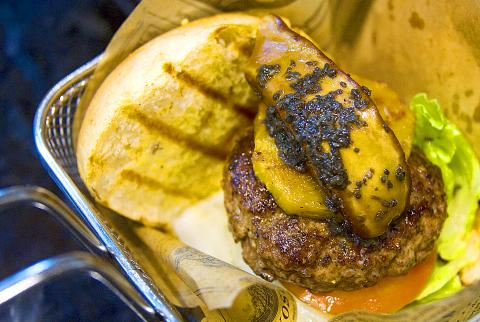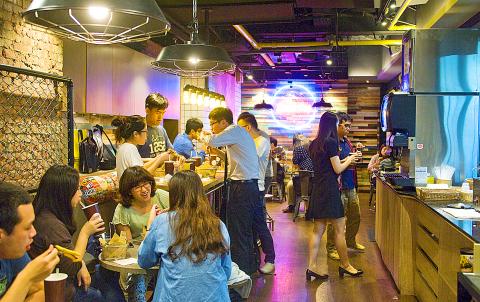I’m not sure what I was expecting when I walked into a restaurant featuring a “Heart Attack Burger” — but my stomach still let out a small cry of pain when a stream of meat grease literally poured out of the sandwich upon first bite.
Burger Ray (個性漢堡) has generated much hype since it opened in the heart of Taipei’s east district in July. As expected, there was a crowd of people waiting for seats in front of the restaurant, though there is a standing table for the less patient. It’s a bit claustrophobic in the front with a cluster of tables, but opens to a more comfortable seating area in the back.
This place is a no-frills burger joint. You order at the counter next to the door off a basic menu that only contains burgers, shakes and drinks. No appetizers, no desserts. There’s a 50-minute eating limit, but with the basic menu and reasonably fast service, I doubt you will need longer than that. And come on, it’s Taiwan. They won’t kick you out.

Photo: Han Cheung, Taipei Times
The special burgers are already garnished, but those ordering the basic build-it-yourself creation can enjoy an all-you-can-eat toppings bar with the usual lettuce, tomatoes, onions, pickles, salsa and jalapenos. There’s also unlimited beef chili and cheese you can add to your fries — probably the best feature of this place.
Customers can add NT$50 for fries and a drink. If you feel guilty about eating so much greasy and fried stuff, luckily, you can “make up” for it by going for sugar-free green tea instead of Mountain Dew.
So let’s get to the burgers, made with USDA Choice beef patties. Of course I had to order the Heart Attack (NT$400), which is curiously only named so in Chinese (心臟病堡). The English name literally describes the toppings: a generous slice of foie gras, truffles and your choice of caramelized onions or candied pineapple. I chose the latter, which was probably a mistake.

Photo: Han Cheung, Taipei Times
I had a choice between brioche, ciabatta and multi-grain buns. To save whatever of my health would be left after the meal, I went with the multi-grain, which was excellently prepared — toasted and buttery with the smell of whole wheat.
My friend took the safe route and went with the basic signature burger (NT$145), which is really cheap compared to other Taipei joints. For extra cash you can add toppings such as bacon, mushrooms, fried egg, sauerkraut and, well, foie gras.
My burger was a disaster. The components on their own probably would have been decent, as the beef was tender and moist, although it could have been leaner. There were simply too many things at work in one bite, and the bun immediately became soggy from all the juicy forces at work, which doesn’t go well texture-wise with the fatty foie gras. The pineapple had the right amount of firmness, but its sweet tang completely overpowered the truffle. As a result, all the textures and flavors were muffled or mushed into each other, and simply creating my own Hawaiian burger would have been a better choice.
My friend’s burger was much better — a bacon, Swiss and mushroom concoction that was much less messy. Although there was still a bit too much grease from the meat, it wasn’t as bad as mine.
The fries (NT$60 a la carte) were the meal’s saving grace, probably some of the best I’ve tried in Taipei. Perfectly crisp on the outside and full of satisfying moist potato goodness, I finished the whole basket, something I usually don’t do.
The fries are not spiced, which is a perfect invitation to pour the all-beef chili sauce and cheddar cheese directly on top. The chili is subtle with hints of tomato and peppers, and at no point takes over, meshing well with the cheese. The textures also go well together — the fries retain their crispness, the beef tender and chewy and the cheese adds just the perfect amount of viscosity.
It’s my fault for ordering something called a Heart Attack Burger, but I felt a bit nauseous after the meal and had to go for some tea.
If I come back again, though, I’m interested in checking out the non-beef options: the Southeast Asian pork burger (NT$145) or the seafood burger (NT$185). I’m not sure why a vegetarian would even consider wandering into this place, but if you do, there’s a quinoa mushroom veggie burger (NT$145).

Behind a car repair business on a nondescript Thai street are the cherished pets of a rising TikTok animal influencer: two lions and a 200-kilogram lion-tiger hybrid called “Big George.” Lion ownership is legal in Thailand, and Tharnuwarht Plengkemratch is an enthusiastic advocate, posting updates on his feline companions to nearly three million followers. “They’re playful and affectionate, just like dogs or cats,” he said from inside their cage complex at his home in the northern city of Chiang Mai. Thailand’s captive lion population has exploded in recent years, with nearly 500 registered in zoos, breeding farms, petting cafes and homes. Experts warn the

The unexpected collapse of the recall campaigns is being viewed through many lenses, most of them skewed and self-absorbed. The international media unsurprisingly focuses on what they perceive as the message that Taiwanese voters were sending in the failure of the mass recall, especially to China, the US and to friendly Western nations. This made some sense prior to early last month. One of the main arguments used by recall campaigners for recalling Chinese Nationalist Party (KMT) lawmakers was that they were too pro-China, and by extension not to be trusted with defending the nation. Also by extension, that argument could be

Aug. 4 to Aug. 10 When Coca-Cola finally pushed its way into Taiwan’s market in 1968, it allegedly vowed to wipe out its major domestic rival Hey Song within five years. But Hey Song, which began as a manual operation in a family cow shed in 1925, had proven its resilience, surviving numerous setbacks — including the loss of autonomy and nearly all its assets due to the Japanese colonial government’s wartime economic policy. By the 1960s, Hey Song had risen to the top of Taiwan’s beverage industry. This success was driven not only by president Chang Wen-chi’s

Last week, on the heels of the recall election that turned out so badly for Taiwan, came the news that US President Donald Trump had blocked the transit of President William Lai (賴清德) through the US on his way to Latin America. A few days later the international media reported that in June a scheduled visit by Minister of National Defense Wellington Koo (顧立雄) for high level meetings was canceled by the US after China’s President Xi Jinping (習近平) asked Trump to curb US engagement with Taiwan during a June phone call. The cancellation of Lai’s transit was a gaudy